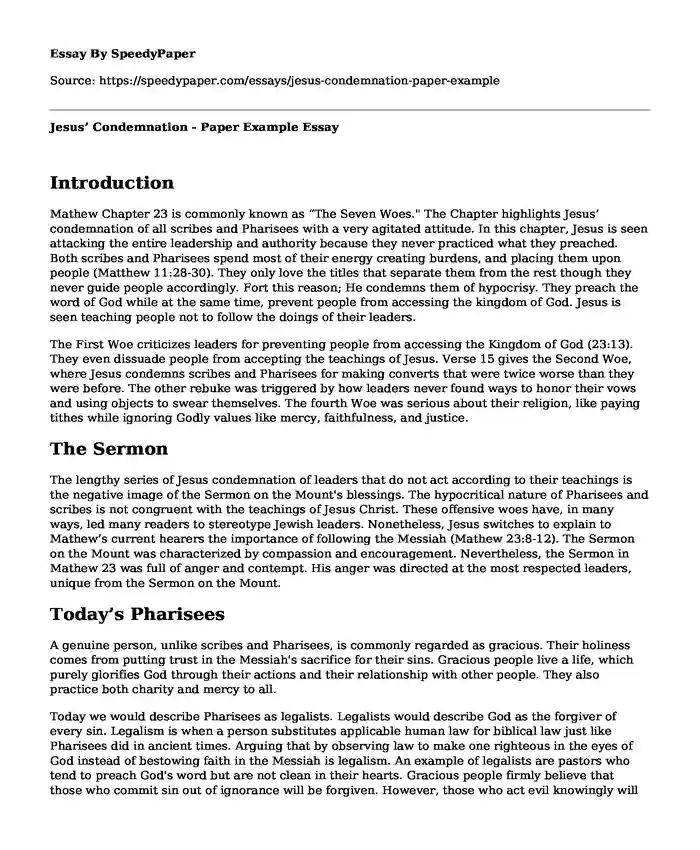
| Type of paper: | Essay |
| Categories: | Bible |
| Pages: | 3 |
| Wordcount: | 614 words |
Introduction
Mathew Chapter 23 is commonly known as “The Seven Woes." The Chapter highlights Jesus’ condemnation of all scribes and Pharisees with a very agitated attitude. In this chapter, Jesus is seen attacking the entire leadership and authority because they never practiced what they preached. Both scribes and Pharisees spend most of their energy creating burdens, and placing them upon people (Matthew 11:28-30). They only love the titles that separate them from the rest though they never guide people accordingly. Fort this reason; He condemns them of hypocrisy. They preach the word of God while at the same time, prevent people from accessing the kingdom of God. Jesus is seen teaching people not to follow the doings of their leaders.
The First Woe criticizes leaders for preventing people from accessing the Kingdom of God (23:13). They even dissuade people from accepting the teachings of Jesus. Verse 15 gives the Second Woe, where Jesus condemns scribes and Pharisees for making converts that were twice worse than they were before. The other rebuke was triggered by how leaders never found ways to honor their vows and using objects to swear themselves. The fourth Woe was serious about their religion, like paying tithes while ignoring Godly values like mercy, faithfulness, and justice.
The Sermon
The lengthy series of Jesus condemnation of leaders that do not act according to their teachings is the negative image of the Sermon on the Mount's blessings. The hypocritical nature of Pharisees and scribes is not congruent with the teachings of Jesus Christ. These offensive woes have, in many ways, led many readers to stereotype Jewish leaders. Nonetheless, Jesus switches to explain to Mathew’s current hearers the importance of following the Messiah (Mathew 23:8-12). The Sermon on the Mount was characterized by compassion and encouragement. Nevertheless, the Sermon in Mathew 23 was full of anger and contempt. His anger was directed at the most respected leaders, unique from the Sermon on the Mount.
Today’s Pharisees
A genuine person, unlike scribes and Pharisees, is commonly regarded as gracious. Their holiness comes from putting trust in the Messiah's sacrifice for their sins. Gracious people live a life, which purely glorifies God through their actions and their relationship with other people. They also practice both charity and mercy to all.
Today we would describe Pharisees as legalists. Legalists would describe God as the forgiver of every sin. Legalism is when a person substitutes applicable human law for biblical law just like Pharisees did in ancient times. Arguing that by observing law to make one righteous in the eyes of God instead of bestowing faith in the Messiah is legalism. An example of legalists are pastors who tend to preach God's word but are not clean in their hearts. Gracious people firmly believe that those who commit sin out of ignorance will be forgiven. However, those who act evil knowingly will not be forgiven.
Conclusion
The 5th, 6th, and 7th Woes are all intertwined, unlike the first four woes. They portray the hypocritical nature of the authority. Pharisees and scribes were likened to dishes, which were very clean on the outer part but were not appealing inside. There is a seamless transition between the first four woes and the last three woes (Verse 29-36). Jesus likens Pharisees and scribes with an appealing tomb, although the inside is dead bones. Here, tombs and dishes are used to expose their nature of hypocrisy. Jesus concludes this Chapter by lamenting and showing concern on the children of God who will see His coming as God’s blessing.
Work Cited
Matthew 23:13-39. Retrieved from:
https://www.biblegateway.com/passage/?search=Matthew%2023:13-39&version=NIVMathew 23: 13-39.
Cite this page
Jesus' Condemnation - Paper Example. (2023, Dec 12). Retrieved from https://speedypaper.com/essays/jesus-condemnation-paper-example
Request Removal
If you are the original author of this essay and no longer wish to have it published on the SpeedyPaper website, please click below to request its removal:
- Free Essay Analyzing the Parable of the Good Samaritan
- Free Essay: Art and the Bible by Francis Schaeffer
- Essay Sample on Global Church Trends
- Essay Sample on Debating Terrorism and Counterterrorism
- Paper Example. Sacred Time in Abraham Joshua Heschel's "The Sabbath"
- Essay Sample on Image of Salvation
- Essay Example on A Case Analysis on Patient's Spiritual Needs
Popular categories




